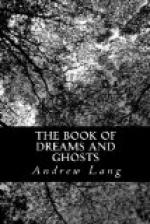There is only the very vaguest evidence for hauntings at Lady Hillsborough’s old house of Hinton Ampner, near Alresford, before Mr. Ricketts took it in January, 1765. He and his wife were then disturbed by footsteps, and sounds of doors opening and shutting. They put new locks on the doors lest the villagers had procured keys, but this proved of no avail. The servants talked of seeing appearances of a gentleman in drab and of a lady in silk, which Mrs. Ricketts disregarded. Her husband went to Jamaica in the autumn of 1769, and in 1771 she was so disturbed that her brother, Captain Jervis, a witness of the phenomena, insisted on her leaving the house in August. He and Mrs. Ricketts then wrote to Mr. Ricketts about the affair. In July, 1772, Mrs. Ricketts wrote a long and solemn description of her sufferings, to be given to her children.
We shall slightly abridge her statement, in which she mentions that when she left Hinton she had not one of the servants who came thither in her family, which “evinces the impossibility of a confederacy”. Her new, like her former servants, were satisfactory; Camis, her new coachman, was of a yeoman house of 400 years’ standing. It will be observed that Mrs. Ricketts was a good deal annoyed even before 2nd April, 1771, the day when she dates the beginning of the worst disturbances. She believed that the agency was human—a robber or a practical joker—and but slowly and reluctantly became convinced that the “exploded” notion of an abnormal force might be correct. We learn that while Captain Jervis was not informed of the sounds he never heard them, and whereas Mrs. Ricketts heard violent noises after he went to bed on the night of his vigil, he heard nothing. “Several instances occurred where very loud noises were heard by one or two persons, when those equally near and in the same direction were not sensible of the least impression.” {223}
With this preface, Mrs. Ricketts may be allowed to tell her own tale.
“Sometime after Mr. Ricketts left me (autumn, 1769) I—then lying in the bedroom over the kitchen—heard frequently the noise of some one walking in the room within, and the rustling as of silk clothes against the door that opened into my room, sometimes so loud, and of such continuance as to break my rest. Instant search being often made, we never could discover any appearance of human or brute being. Repeatedly disturbed in the same manner, I made it my constant practice to search the room and closets within, and to secure the only door on the inside. . . . Yet this precaution did not preclude the disturbance, which continued with little interruption.”
Nobody, in short, could enter this room, except by passing through that of Mrs. Ricketts, the door of which “was always made fast by a drawn bolt”. Yet somebody kept rustling and walking in the inner room, which somebody could never be found when sought for.




